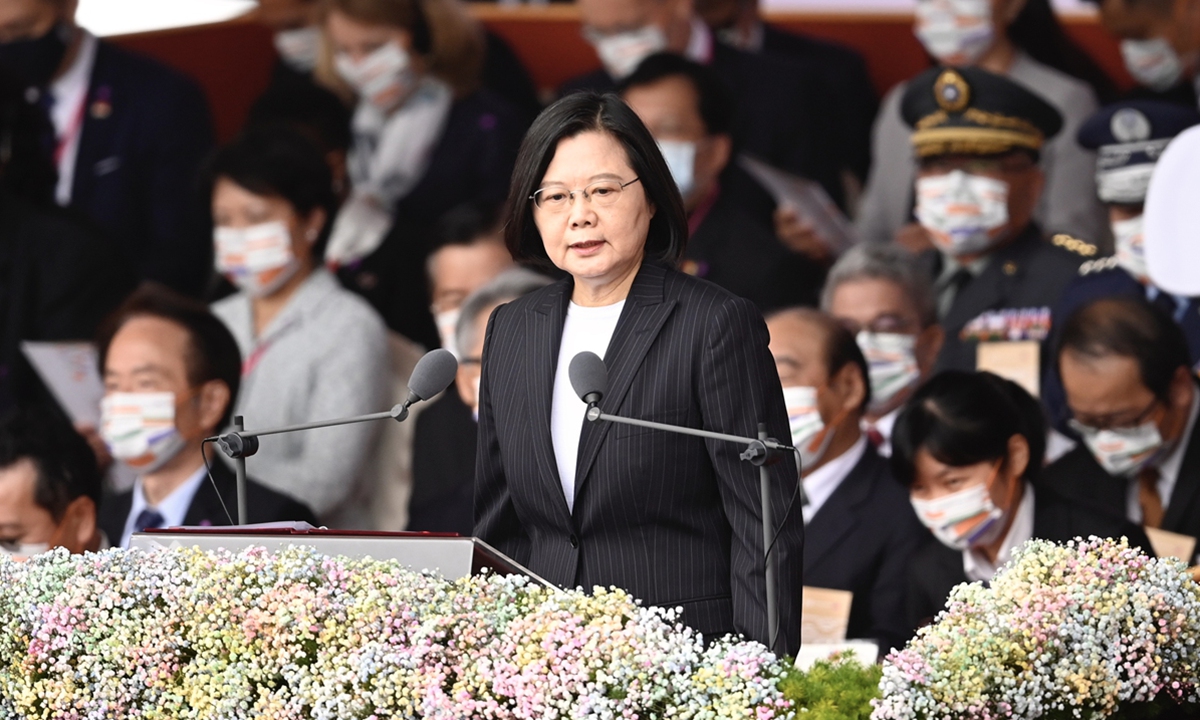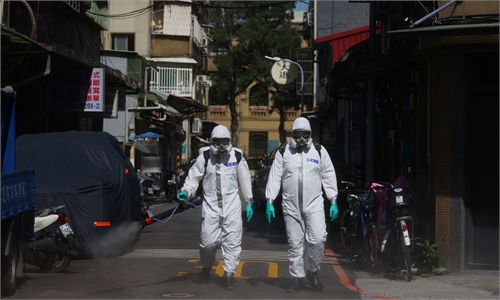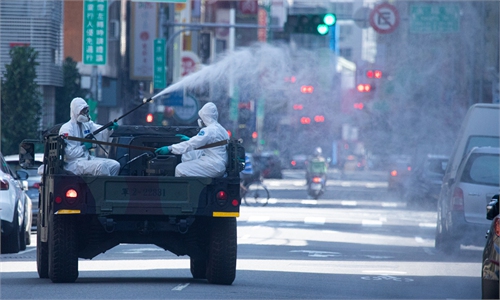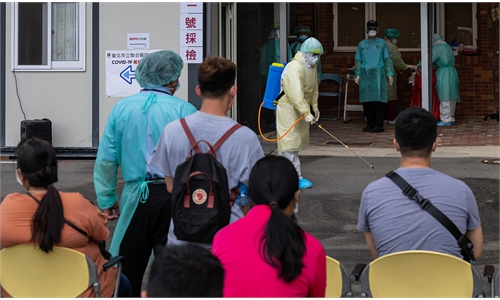Pledges punctured, DPP’s Tsai enters 6th year with approaching power slump
Pledges punctured, power slump comes earlier than expected: experts

Tsai Ing-wen, the regional leader of the island of Taiwan and the pro-secessionism Democratic Progressive Party (DPP) speaks during the "Double Ten" address in Taipei on October 10, 2020. Photo: AFP
One year after winning reelection with a record high share of the vote, Tsai Ing-wen, regional leader of the island of Taiwan, on Thursday entered the second year of her second term amid a huge COVID-19 resurgence and boiling public resentment, and experts said her power slump is coming much earlier than expected.
At Tsai's inauguration ceremony on May 20, 2020, the leader of the pro-secessionism Democratic Progressive Party (DPP) boasted of the island's success in the fight against COVID-19, vowed to strengthen the health and disease prevention safety net, develop the energy industry and have active international participation. However, all these pledges were punctured a year later by the DPP government itself.
Without a high-profile public presence, Taiwan media said that Tsai visited a military anti-epidemic center on Thursday and encouraged the troops to maintain high morale and be confident in the anti-virus fight. The opposition camp described Tsai's special day as the "quietest" anniversary.
The island reported 273 new COVID-19 cases on Wednesday, with an average of 186 infections in the last seven days. With the suspension of classes and public entertainment spaces, the local health authorities raised the third-level emergency alert.
The island led by Tsai, which has always boasted of being an "excellent student" under the banner of "Taiwan can help," has being facing a "catastrophic situation." Two power cuts in a week affected millions of people and intermittently cut off water supplies to many areas, leaving one-quarter of the farmland dry. After recently announcing that the epidemic had spread within the community, the Democratic Progressive Party (DPP) denigrated the motives of the Chinese mainland by rejecting vaccines when only 310,000 doses on the island were available.
While the public was still waiting for an apology from the DPP authorities, an online poll conducted by Taiwan Yahoo News on Tuesday showed that 79.5 percent of the respondents said they were "very dissatisfied" with Tsai's administration.
Another poll released by Taiwan-based media TVBS on Monday showed that the satisfaction rating of Tsai was 41 percent, a 20 prcentage point decline compared with May 2020, when she was reelected as the regional leader.
Some analysts said that Tasi is losing support from both the public and within the DPP.
"Tsai has never won over the DPP's various factions in power," Chang Ya-chung, a Taipei-based political scientist and member of the opposition party Kuomintang (KMT), told the Global Times on Thursday.
Chang explained that from 2016 to 2020, when Donald Trump was the US president, Tsai worked with the US against the Chinese mainland in various ways to gain US support, which can be used as a tool to suppress various factions in her party and the KMT. However, in the Biden era, Tsai lost right-wing hawkish backers in the White House.
Tsai's power slump is coming sooner than the midterm elections in 2022, and with this comes a renewed power struggle within the DPP, Chang said, noting that Taiwan people are losing patience and trust in her.
Zhang Wensheng, a deputy director of the Taiwan Research Institute of Xiamen University, told the Global Times on Thursday that from the very beginning since Tsai took office, the DPP authorities have been driven by their pro-US and anti-mainland policy, which is the root of its current internal and external difficulties.
Taiwan people's discontent with the DPP has been building over the past year, taking the examples of the idea of importing ractopamine-enhanced pork from the US, and the "spineless" stance on Japan's decision to dump nuclear-contaminated water, Zhang said.
Denial and smearing the mainland's vaccines may make people in Taiwan suffer from the epidemic for a long time. The island's economy is mainly based on exports and services. The suspension of industries amid the epidemic will be a huge blow to the local services sector, which accounts for 60 percent of the island's total employment, experts told the Global Times.
A government official in Honduras, one of Taiwan's single-digit allies in Central America, said on Wednesday that the country could shift to the Chinese mainland due to the vaccine shortage, as its allies - including the island of Taiwan and the US - have never helped the country.





